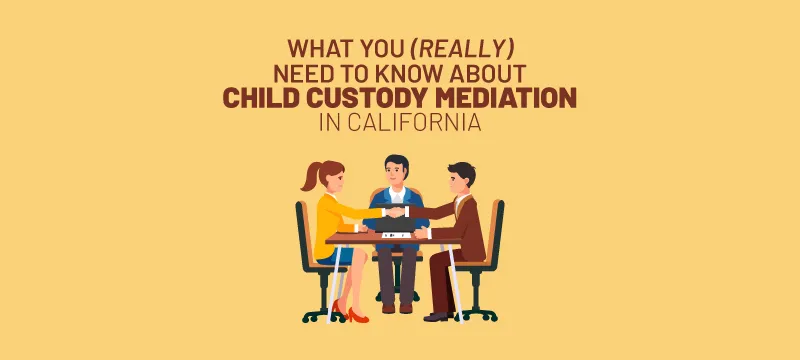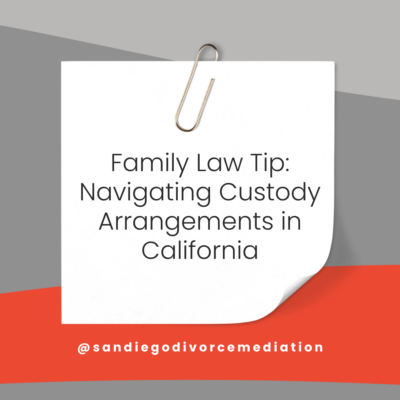
Child custody mediation in San Diego California is a process in which parents seek collaborative solutions through mediation for child custody to resolve any disputes that they may have regarding their children without having to go to court.
Custody mediation is an important step for parents to take if they wish to reach a custody and parenting plan agreement through a safe and child focused process that considers the best interests of the children.
Let’s discuss what to expect in navigating a San Diego child custody mediation process so that you can be prepared and informed when they enter into the process.
What is Child Custody Mediation in California?
Child custody mediation in San Diego is a process where parents or guardians of a child come together to resolve disputes and come to an agreement about the child’s custody and care. This process is often utilized in cases of divorce or separation, where the parties involved cannot come to an agreement about their child’s best interests.
In California, child custody mediation is a mandatory process for all parents going through a divorce or separation. The court requires that all parties attend mediation sessions with a court-appointed mediator or a mediator of their choosing. This process is intended to provide an opportunity for parents to work together and come up with a mutually agreeable plan for their child’s care.
During mediation, the mediator acts as a neutral third party and helps guide the conversation towards a resolution. They facilitate communication and assist parents in brainstorming possible solutions to any issues they may be facing. While the mediator can make suggestions, they do not have the authority to make any decisions or force a particular outcome.
Is San Diego Custody Mediation Confidential?
Anything said during mediation is confidential and cannot be used in court. This allows parents to be more open and honest about their concerns and ideas without fear of it being used against them in future court proceedings.
How to Choose a Child Custody Mediator Near San Diego CA?
When it comes to child custody mediation, selecting the right San Diego mediation lawyer is crucial. One of the best ways to find the best custody mediator for your family’s needs is through recommendations from friends, family, or referrals from your accountant, financial advisor ot estate planning attorney or a family lawyer.
It is important to make sure the mediator you choose has experience specifically in child custody mediation and has the appropriate training and certification.
Additionally, it’s important to make sure that you feel comfortable working with the mediator you choose. The mediator should be impartial and not take sides, but they should also be able to understand your concerns and help you find common ground with your ex-spouse.
Ultimately, the mediator you choose can have a significant impact on the success of your child custody mediation. So take the time to research your options, ask questions, and choose a mediator that you feel confident will help you and your ex-spouse work through your differences and find a resolution that is in the best interest of your child.
How to Prepare for Mediation for Child Custody in San Diego
The process can be stressful, but being prepared can help you feel more confident going into the session. Here are some tips on how to prepare for child custody mediation:
- Understand the process: Familiarize yourself with the child custody mediation process in California. Understand what is expected of you, what the mediator’s role is, and how decisions will be made. This will help you approach the mediation with a clear understanding of what to expect.
- Communicate with your ex-spouse: Even though you may be going through a divorce, it’s important to communicate with your ex-spouse when it comes to preparing for child custody mediation. Talk to them about the process, what you hope to achieve, and any concerns you have.
- Keep the best interests of your child in mind: The main focus of child custody mediation is the well-being of your child. Be prepared to compromise and work with your ex-spouse to find a solution that is in the best interests of your child.
- Gather documentation: Collect all the relevant documentation you need for the mediation session, such as financial information, custody schedules, and any relevant court orders.
- Prepare a parenting plan: Be prepared to present a parenting plan that outlines your proposed custody arrangement, including schedules for visitation, holidays, and special events.
- Practice active listening: During mediation, it’s important to listen actively to your ex-spouse and the mediator. This means hearing and understanding their point of view, even if you don’t agree with it. This will help you to find common ground and work towards a solution that works for everyone.
By following these tips, you can prepare for child custody mediation in California and increase your chances of a successful outcome. Remember to stay focused on the well-being of your child and be prepared to compromise and work together to find a solution that works for everyone.
Tips for a Successful Custody Mediation Process
Child custody mediation in California can be an emotionally charged process. To ensure that you get the most out of your mediation session, consider these tips for successful mediation:
- Approach the session with an open mind: Divorce mediation is all about compromise. To reach a successful agreement, both parties need to be open to hearing the other’s perspective.
- Be honest and transparent: Honesty is key to a successful mediation session. Be transparent about your feelings, concerns, and needs for your children. This helps the mediator understand your situation better and provide a resolution that works for both parties.
- Keep your emotions in check: It’s natural to be emotional during a custody battle, but letting those emotions take control of the session can be counterproductive.
- Be prepared to negotiate: Successful mediation often involves give-and-take negotiations. Come to the session with a clear idea of what you want and what you’re willing to compromise on.
- Listen carefully: Listen carefully to the other party’s needs and concerns. Doing so shows respect and demonstrates your willingness to work together towards a resolution.
Why Choose San Diego Custody Mediator Scott Levin
Consider Scott Levin as your custody mediator if you are hoping to find a compassionate and caring mediation lawyer. For more than 20 years Scott has helped thousands of parents settle outside of court with balanced custody and visitation plans tailored to their family’s unique needs, keeping children’s best interests at the forefront.
Learn more about our 5 star rated services by contacting California custody mediation center for a free consultation or call 8582551321



















